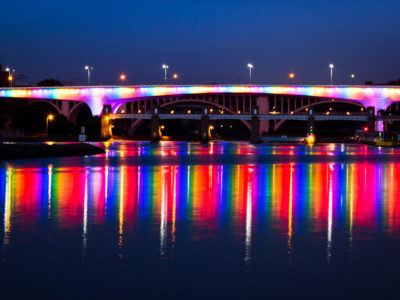When I finally came out, I hadn’t planned or prepared to do so. Instead, it felt like a moment of impulse where I needed to let this secret out. Even though I grew up in the San Francisco Bay Area and I knew my parents would likely accept my sexuality, I remained terrified of their reaction as well as the reactions of everyone around me. I had the courage to come out because I knew a fresh start awaited two months later when I started college 2,800 miles away from home.
Unlike a lot of my friends in high school, I didn’t stay in the closet because I worried about the judgment of others. I didn’t worry about being bullied for my bisexuality in high school because of my school’s large LGBT+ presence. Instead, the judgment came from myself. As someone who knew that I liked guys and that I might like girls, the bisexual label terrified me. The only thing I knew about bisexuals involved the negative connotations that they were just confused, that they couldn’t stay monogamous and that they were sluts. Although I had a lot of LGBT+ friends in high school, I didn’t feel “gay enough” to be one of them. I look like a straight woman (if the look of a gay woman even exists), I dated boys exclusively and I didn’t like flannel.
In my experience, judgment from others or from yourself slows down or stops people from coming out. It took me the entirety of high school to break down those stereotypes and accept that the label made sense for me. I hadn’t suddenly stopped judging myself after high school, but instead I had just taken those four years to learn about myself and my identity and feel comfortable with the label.
I’m not the only one who felt more comfortable coming out after high school. According to the Pew Research Center, 18 marks the median age that gay men first tell someone about their identity, 21 for lesbians and 20 for bisexuals. “I definitely felt like I was liberated from being away from home. I think that making a lot of new friends who were very supportive and comfortable in their own skin, definitely helped me come to terms with this part of my identity,” said American University sophomore Brandan Persaud.
I hear from a lot of other LGBT+ college students that they didn’t come out until their last semester of high school or first semester of college. “I was fortunate to be able to come out in my first year of college, especially at that time because I was still inventing myself on campus. I was far enough away from home that I could explore this new identity,” said AU senior Jenna Shaw. Unlike high school, college gives students time to explore their identity and test their limits.
Coming out in college means people get access to tons of resources that come in handy when they feel ready. My school, American University, offers an LGBT+ peer advisor program. Before I even stepped onto campus, I exchanged emails with a current student who helped me when I decided to come out. More colleges currently work to create centers of diversity and inclusion that host events and groups for students in different stages of their coming out process.
I still sometimes feel not “gay enough,” but college taught me that identifying as a member of the LGBT+ community doesn’t mean you need to fit the stereotypes. Being queer means that I can identify as LGBT+ and still wear dresses and date boys. My identity is more multifaceted than just the bisexual label.
Coming out after high school also means people won’t deal with those who won’t accept their LGBT+ identity. “The best part of coming out for me, is to finally be able to ‘like’ or ‘share’ whatever I want on Facebook and other forms of social media, without having to worry about what other may think of me,” said Persaud. If the student didn’t enjoy their high school experience, they can delete all the people who didn’t treat them well on Facebook.
Since coming out, most of my experiences seem positive. Sometimes I’ll get the occasional obnoxious request for a threesome. Some of my extended family pretends my sexuality doesn’t exist, but those mark the only exceptions to my experience.
People jokingly refer to my university as Gay Jew (instead of AU) because of its large population of queer Jews (I fit into both categories). It means I’m usually either in the majority or in an unnoticeable minority in terms of my sexuality. Knowing so many queer people surround me makes me feel like I’m not weird, something that everyone wants to feel. “The best part of coming out when I did was the overwhelming support. I had just joined by sorority and I was so lucky because a number of the older members took me under their wings, even if they were not all gay,” said Shaw.
I don’t think coming out in high school would’ve led to more negative experiences for me personally. However, I don’t think I felt ready to handle what comes with identifying with the LGBT+ community. I would’ve felt like I did it because of peer pressure, not because I felt ready to come out.
Above all, keep in mind that figuring out your LGBT+ identity around the start of college doesn’t make you less of a member. Coming out at 18 or 19 doesn’t make you any less of your identity—actually, you might even encounter an easier experience.
When you come out in college, you can finally be yourself. You can get support from people who experienced similar situations. Just like your major, you don’t need to figure out your identity before you get to college. The whole point of going to college means taking the time to explore your identity and sexuality in a friendly environment.



















